|
 |
|
 |
|
Opposite the saltiest sea in the world is
the oasis of En Gedi with its four springs
of sweet water. This abundance of
fresh water attracts the ibex, a wild agile
goat-like animal which makes startlingly
graceful vertical leaps up the sheer
limestone cliffs of the Judean wilderness. |
|
|
|
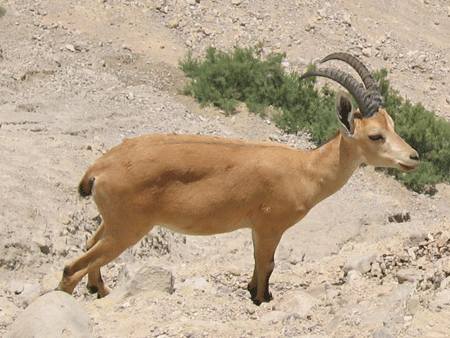 |
|
Photo:
Gila Yudkin |
|
Nubian Ibex at En Gedi |
|
|
|
It was in the "Rocks of the Ibex" (or as the
King James version calls them, the wild
goats) that David, a man on the run, had
gone to hide from a furious Saul who had
determined to kill him. After David
killed the uncircumcised giant with a sling
and a stone, the number one download on i-tunes
was "Saul has his thousands, but David his
ten thousands!" (First Samuel 18) When
the Israelite women danced to this ditty,
Saul simply went berserk. |
|
|
|
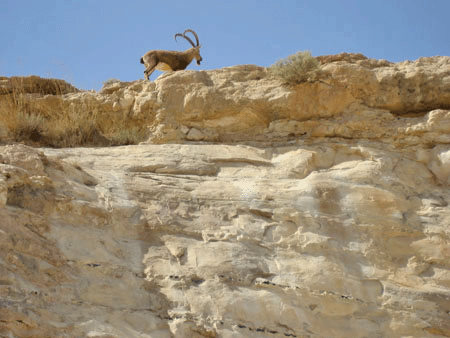 |
|
Photo:
Gila Yudkin |
|
The outlaw David hid in
the Rocks of the Ibex at En Gedi |
|
|
|
At his hide-away in the stronghold of En
Gedi, David had a most unexpected encounter
with Saul – in the most embarrassing
circumstances imaginable for the Israelite
king. Saul had the misfortune to enter
the very cave where David and his group of
outlaws were hiding in order to "cover his
feet." This is a very vivid
euphemistic image. While Saul was
squatting to answer the call of nature,
David crept up to tear off part of the royal
robe.
When David presented Saul with the torn
piece, Saul probably had a flashback to
another ripped garment – this time Samuel's.
During their last meeting as Samuel rose
suddenly to depart, Saul grabbed onto
Samuel's robe and accidentally tore it.
Samuel sternly announced, "Today the Lord
has torn the kingdom of Israel from you and
given it to a neighbor of yours who is
better than you." (First Samuel 15:
28) |
|
|
|
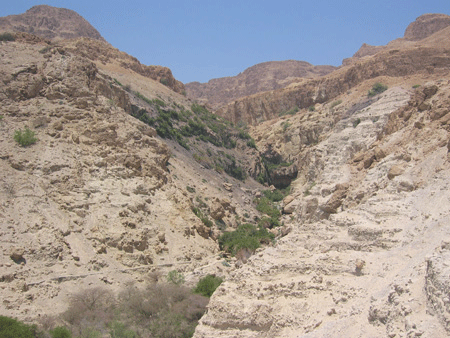 |
|
Photo:
Gila Yudkin |
|
Oasis of En Gedi in the Judean
Wilderness |
|
|
|
At En Gedi Saul realized that David, who had
just spared his life, was the one to receive
the kingdom – instead of his eldest son,
Jonathon. A remorseful Saul begged for
forgiveness and swore never to try to kill
David again. This vow he kept…until
his next fit of jealousy! |
|
|
|
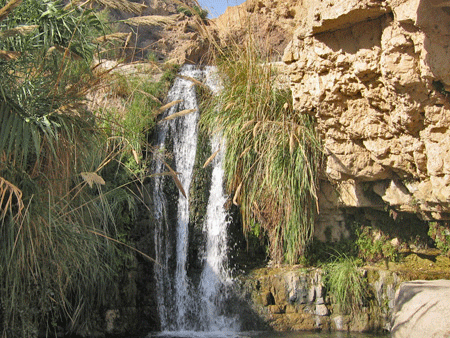 |
|
Photo:
Gila Yudkin |
|
David's waterfall at the
En Gedi oasis |
|
|
|
Just as En Gedi served as a refuge for
David, the psalmist says, "the high hills
are a refuge for the ibex." (Psalm
104: 18) As we walk through En Gedi's
nature reserve, we often see ibex
(pronounced eye-becks with singular and
plural the same word) scampering up the
rocky cliffs for safety. Even the most
skilled human rock climber cannot keep up
with an ibex more than two days old! |
|
|
|
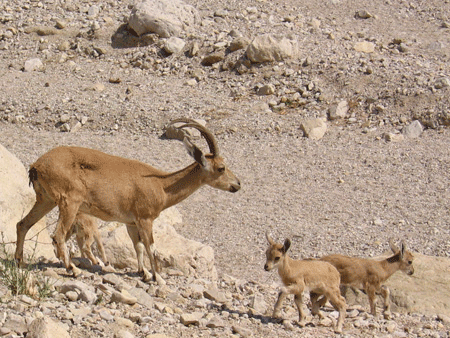 |
|
Photo:
Gila Yudkin |
|
Mom and baby ibex at En
Gedi |
|
|
|
During mating season we watch and listen as
the males butt their long arched horns
against each other in a ritual ceremony to
determine who will win the female. Whenever
I see this contest, I can't help but
fantasize what it would be like to have two
males – or even three – fighting so intently
to win my affections! |
|
|
|
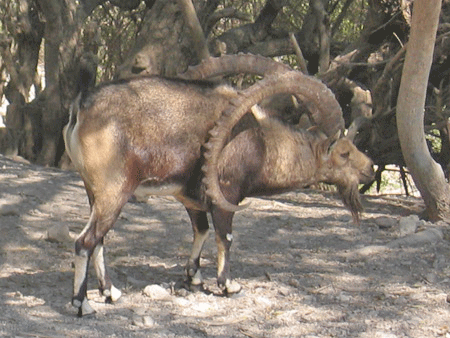 |
|
Photo:
Gila Yudkin |
|
Great-granddaddy ibex at
En Gedi |
|
|
|
For photographers, En Gedi is a paradise.
Contrast the gray/beige rocks with the lumps
of verdant green grass as the ibex run
across our path. I once saw the
scariest-looking great-granddaddy and
sometimes in season, we see baby ibex, just
been born. And if we can't shoot (i.e.
photograph) the ibex, then we'll look for
coneys or rock badgers. After
mentioning the ibex, Psalm 104 continues,
"and the cliffs are a refuge for the rock
badgers." |
|
|
|
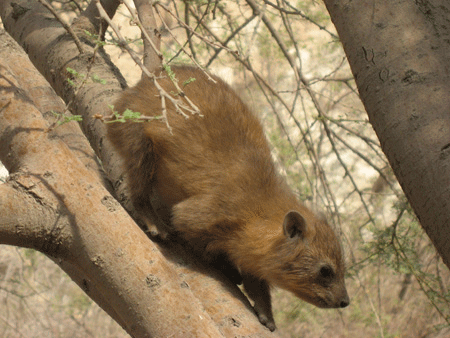 |
|
Photo:
Gila Yudkin |
|
Coney also known as hyrax or rock badger at
En Gedi |
|
|
|
The climate of En Gedi, particularly suited
to the ibex and coney, was also ideal for
the cultivation of date palms. The
Apocryphal book of Ben Sira says, "I was
exalted like a palm tree in En Gedi." |
|
|
|
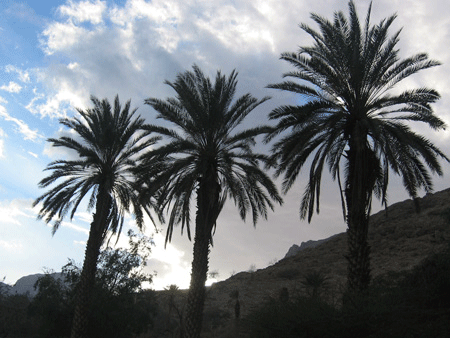 |
|
Photo:
Gila Yudkin |
|
En Gedi is also known as
the city of the date palms |
|
|
En Gedi's climate was also idea for balsam.
Extracted oil from the balsam, when
processed in a secret way known only to the
ancient residents of En Gedi, produced THE
most exotic perfume in the entire empire of
Rome.
When it was
Cleopatra's
birthday, her lover Marc Antony presented
her with a vial of perfume extracted from
the balsam plant in En Gedi, and for good
measure, threw in the balsam plantations
themselves! Remind me on site to share
some juicy balsam stories with your group… |
|
|
|
Come with me, you photographers, to the
lovely oasis of En Gedi where we'll try to
shoot ibex, male and female of all ages.
Start your own collection of evocative holy
land photos! |
|
|
|
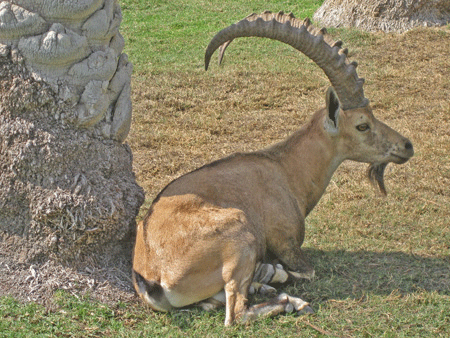 |
|
Photo:
Gila Yudkin |
|
Male ibex resting against
a date palm at En Gedi, 2010 |
|
|
|
Copyright 2011 Gila Yudkin. Permission
needed for any reuse. |
|
|
|
Gila
Yudkin, a Connecticut-born Yankee
living in King David's court, has been
hiking in En Gedi for way over three
decades. It's getting steeper (!) but
she loves sharing the adventure of finding
ibex with her groups. Gila's tours are
a mix of biblical fun, fantasy and fact, as
she adds color and contour to your favorite
Sunday School stories. |
|
|
Fellow Connecticut Yankee
Edward Robinson
identified Masada while he was waiting for
the water to boil early one morning in 1838
at En Gedi. Read about how Robinson
tackles biblical geography.
Cleopatra was not from Connecticut!
She was not Egyptian either, nor was she
beautiful. Get the true scoop on
Cleopatra and the holy land. |
|
|
|
|

